Which Tower Is Yours?
Pastor Michael Blog 14 Jul 2019 Michael Falzarano

And they said, "Come, let us build ourselves a city, and a tower whose top is in the heavens; let us make a name for ourselves, lest we be scattered abroad over the face of the whole earth." Genesis 11:4 (NKJV)
After the flood, on the plain of Shinar, some united to build a city and an extraordinary tower. The plain was a desirable place to gather, but it was also an open and vulnerable location. God had promised not to destroy the world again by floodwaters (Genesis 9:11). However, they believed Him not. Therefore, they took matters into their own hands by building a tower of great height and strength.
The name Babel originally meant gate of god. Building with human reason and might, they devised their own gate to reach the heavens. Many do the same today. They figure their human goodness and efforts will save them. But such pride and self-sufficiency makes for a faulty foundation. Rather, it's a humility that denies self and puts one's full trust in Christ, that makes for a firm one.
Besides self-preservation, there are two reasons stated for building the Tower of Babel. The first was to make themselves a name. Instead of seeking to uplift God’s name, they were bent on gaining earthly acclaim and significance. As Christians our boast should only be in Christ (Galatians 6:14)!
Another reason they built the tower was so they wouldn’t be scattered. After the flood, God told mankind to “be fruitful and multiply, and fill the earth” (Genesis 9:1). However, these people sought the opposite, to collect together and construct their own empire on the plain of earthly wisdom. As Christians we are to scatter; to “go” and “make disciples” (Matthew 28:19). We are to be fruitful, that is bearing the fruit of the Spirit (Galatians 5:22,23). And we are to multiply by making disciples. This is how God’s kingdom is to grow. By no means are we to unite in order to build a worldly fortress! The church is not a fortress to the outside world. Rather, it's to be a transmitter of God's love and gospel into the world.
To thwart the builder’s purpose, heaven exposed their pride and folly. They tried to reach up, into the heavens, but notice the irony! God had to come down to them. He then confused their language. As they were now unable to communicate, they could not finish their tower. Their name actually became their shame. Babel became known as confusion and confusion was their lot, as it is the lot of the vain.
Which is your tower? Are you building up your name, or are you putting your full trust in God’s name? “The name of the LORD is a strong tower; the righteous run to it and are safe” (Proverbs 18:10).
Image used by permission of SermonView
Sitting At The Feet Of Jesus
Pastor Michael Blog 07 Jul 2019 Michael Falzarano
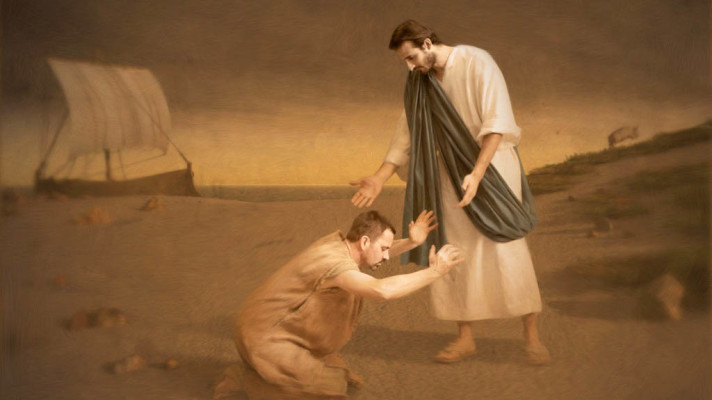
Then they went out to see what had happened, and came to Jesus, and found the man from whom the demons had departed, sitting at the feet of Jesus, clothed and in his right mind. And they were afraid. (Luke 8:35, NKJV).
Jesus had calmed the raging sea before stepping onto the shore of the Gadarenes. Now, a raging savage confronts him and his disciples. What He does for the tempest, He will do for this man. We don’t know this man’s name or identity, for these had long been eclipsed. His image resembled more of a beast. He was naked, wild, unkempt and dirty, and he bore distorted features and actions. This demoniac was also bloody through self-abuse (Mark 5:5). He was terribly lost!
His situation appeared hopeless; he lived with the dead and was often driven into the wilderness. No one or thing could tame him (Mark 5:4). Chains and shackles he could break, but not the oppression of the demons. This man had no power to alter his situation.
People would flee before his presence out of fear and disgust. But not Jesus! Jesus comes to this man. What a picture of the spiritual condition of mankind, for “all have sinned” and there is “none righteous” (Romans 3:23, 10). Our home too is the tombs, this “body of death” (Romans 7:24). The image of God is obscured by selfishness and pride. We stand guilty and naked before God, as did Adam and Eve after they sinned (Genesis 3:10). We are in bondage to the flesh and we are prey to “the wiles of the devil” (Ephesians 6:11). This is why Jesus came to us. He is our only hope!
After a short dialogue with the demon forces, Jesus casts them into a herd of swine. When the natives arrive on the scene, they found the man transformed. He is now sitting at the feet of Jesus, fully clothed and in his right mind. Sitting at the feet of Jesus is how this happens. When we recognize our condition and need, we can turn to Jesus and find healing. He clothes us with His righteousness and our standing becomes that of innocence and purity. It goes further, as God empowers us to be transformed.
This man had a powerful witness now. He wants to follow Jesus across the Sea of Galilee. Instead Jesus tells him to go to his own people. "Return to your own house, and tell what great things God has done for you" (Luke 8:39). His own house would be able to identify the freeing and transformational power of Jesus in him. Jesus bids us to do the same. It’s when your families, friends, neighbors and workmates sees and hears about the work of God in you, that they will ask what has happen? You can tell them you have been sitting at the feet of Jesus.
Image used by permission of SermonView
What Do I Still Lack?
Pastor Michael Blog 24 May 2019 Michael Falzarano
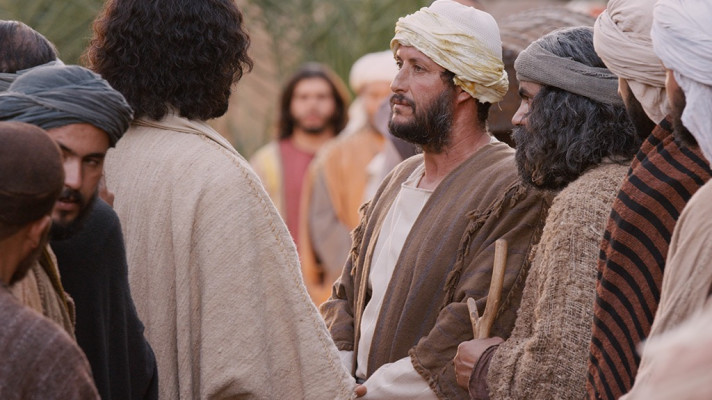
Now behold, one came and said to Him, "Good Teacher, what good thing shall I do that I may have eternal life?" So He said to him, "Why do you call Me good? No one is good but One, that is, God. But if you want to enter into life, keep the commandments" (Matthew 19:16-17).
This young ruler had much going for him. He had youth, riches and position. He was also religious and morally minded. Yet he knew something was needed for him to be complete, to gain eternal life. He therefore asks Jesus to tell him what that was. Jesus told him to “keep the commandments.” Why?
It’s informative that Jesus addresses the second tablet of the Decalogue to the man. The last six commandments concern our relationship to others. Yet Jesus omits the Tenth Commandment concerning covertness. Instead He sums it up by telling him, “You shall love your neighbor as yourself" (verse 19). The man coveted his wealth! His love for money was a wedge between him and God, and others.
We are born with a void, a void only God can fill. We try to fill it in various ways: money, status, work, alcohol, drugs, sports or the arts, relationships, education, religion, etc. We may feign righteousness by trying to keep the commandments through human will power, but this will not succeed. The void within us can only be filled by God and His love. His love is unselfish and sacrificial. He loves because He is love (1John 4:8).
God’s law is founded upon the principle of unselfish love (Matthew 22:35-40). It must be brought into us; His law needs to be written in our hearts and minds (Jeremiah 31:33; Hebrews 8:10). How? God’s finger wrote the Decalogue in stone (Exodus 31:18). His finger also writes the law in our hearts and minds through the Holy Spirit (cf. Luke 11:20 & Matthew 12:28). He does so by filling our void with His love and presence (Romans 5:5)!
What this young ruler still lacked therefore was love! Only through love can we truly keep the commandments. Therefore, Jesus tells the man to divest of his riches and give to the poor, and follow Him. In that way the idol wedged in his heart and mind would be smashed and God would take its place. He would be freed from his idols and enabled to freely love God and serve others.
Jesus tells the man to: go, sell, give and follow (Matthew 19:21). To go meant he would have to act on Jesus’ word. Selling meant to barter or exchange in ancient times. He needed to exchange his unrighteousness for Christ’s righteousness. Then he could receive God’s love and give it to others in practical and tangible ways. Jesus would lead and empower the young man as he followed Him.
However the young ruler rejected Jesus’ offer and left sorrowful. Don’t do the same! Surrender any idol you may have and follow Jesus. God’s love and joy will fill your soul.
Picture used by permission of Lumo Project
Seven Eyes Of The Lamb
Pastor Michael Blog 11 Feb 2019 Michael Falzarano
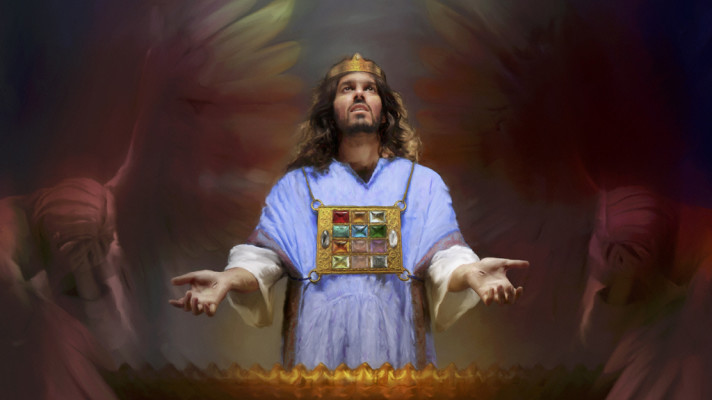
And I looked, and behold, in the midst of the throne… stood a Lamb as though it had been slain, having seven horns and seven eyes, which are the seven Spirits of God sent out into all the earth. (Revelation 5:6, NKJV)
It is a marvelous thing to have two eyes. We can scan the environment and see its beauty, although we can also see its brutality. We can see expressions of joy and of sorrow. However, the apostle John in vision sees a Lamb with seven eyes. Why seven? Seven is symbolic of completeness, fullness or perfection. The seven eyes represent complete sight.
John sees Jesus as the Lamb before the throne of God. He had been slain, sacrificed for the sin of the world (John 1:29). But notice the Lamb is standing. He lives! He died, but rose and ascended to the right hand of God. The scene is that of Jesus’ inauguration as our High Priest after his ascension. It was then, at Pentecost, that Jesus poured out the Holy Spirit to all the Earth. The Spirit is represented as seven Spirits, denoting His full ministry to the world.
With only two eyes we are blind to the recesses of the heart and mind. But it is with seven eyes that God scans to and fro through the whole earth (Zechariah 4:10). He sees into the nock and cranny of every heart. The Apostle Paul writes about the eyes of understanding (Ephesians 1:18). Our great High Priest not only sees, but He understands. He knows the struggles we are going through.
He feels the despair of the drug addict, the pain caused by molestation, the despair of a battered wife, the parent’s grief who has lost a child, etc. Jesus was abandoned, beaten, mocked, rejected, tortured, reviled, betrayed, denied and more. “He has borne our griefs and carried our sorrows” (Isaiah 53:4). On the cross, His sinless heart was ruptured by the weight of our sin and guilt. He bore it all to save us. But his pain didn’t stop at the cross. As long as suffering, tears and death remain; God will suffer along with us. “In all their affliction he was afflicted” (Isaiah 63:9). The good news is that we have a High Priest who can sympathize with us (Hebrews 4:15). We only have two eyes. This makes us quick to judge others! But Jesus sees with seven eyes. He is quick to sympathize and slow to judge.
There was a contest many years ago that sought the most caring child. The winner was a four-year-old boy who consoled his neighbor whose wife had recently died. The aged man was sitting in his yard when the lad darted to him, climbing up on his lap. The mother watched from a distance with astonishment. When the boy returned to her, she asked her four–year-old what he said to the grieving widower. “Nothing,” said the boy, “I just helped him cry.” Such empathy radiates from God’s throne.
How God’s heart must sorrow over the afflictions of mankind. By faith, let’s climb up on His lap and dry some of his tears. How? By loving others. By sympathizing with them in their struggles. Pray for the Spirit. Pray that you can see through His eyes.
Image used by permission of SermonView
Clearing the Clutter
Pastor Michael Blog 03 Feb 2019 Michael Falzarano

Then Jesus went into the temple of God and drove out all those who bought and sold in the temple, and overturned the tables of the money changers and the seats of those who sold doves (Matthew 21:12, NKJV).
Clutter is a problem. It can accumulate in our homes, in our offices, in our vehicles and other areas, to such a degree that it becomes hard to find the thing we are looking for. Clutter gets in the way. This can happen spiritually as well. Things we grab hold of and bring into our lives can clutter our minds and hearts.
Jesus entered again into the Temple at Jerusalem, just four days before his death. He entered through the Huldah gate on its south side. He walked through a magnificent stoa, with 160 columns and would have entered into the Court of the Gentiles. But what does Jesus find within the opulence of the Temple? Clutter! Clutter due to the traffic of animals being sold for sacrifice and moneychangers doing their business. The clutter made it difficult to find God’s presence. So Jesus, the Messiah, bearing heaven’s authority, had to act. And He did. He dramatically cleared the clutter from the Temple by driving away, “all those who bought and sold in the temple”
What was the purpose of the Temple? Jesus quotes Isaiah 56:7, declaring it was to be a house of prayer, and that for all nations (Matthew 21:13). But it became a place of illicit profit. What was the purpose of the Temple? Jesus said, “It is written” (v. 13). It was to be a house where God’s word was proclaimed. What was the purpose of the Temple? It was to be a house for healing. After the corrupting influence was cleared away, we find the blind and lame coming for healing (v. 14). What was the purpose of the Temple? It was to be a house for praise. And it was the children who came forth to praise God (v. 16). What was the purpose of the Temple? The children sang Hosanna (v. 15). Hosanna means save now. The Temple was to be a house for salvation. What was the purpose of the Temple? It was to be a house where God’s presence dwelt. “Let them make Me a sanctuary, that I may dwell among them” (Exodus 25:8). God’s glory filled the Temple in the Old Testament. As foretold, God would fill the Second Temple with His glory. And so He did, as the Son of God had entered it (Haggai 2:7; Matthew 21:12).
What are our churches for? They should be a place to find God’s word uplifted, a place where prayer and praises to God freely flows, a place of healing and salvation. The church is God’s Temple (1 Corinthians 3:16). Therefore, God’s people should be the place where God’s presence is seen. Whatever interferes with this is clutter and needs to be removed.
How is your personal relatinship with God? Is there anything interfering with it? Let go of the clutter! Let Jesus remove it from your life.
Image used by permission of SermonView
God's Certain Word
Pastor Michael Blog 22 Jan 2019 Michael Falzarano
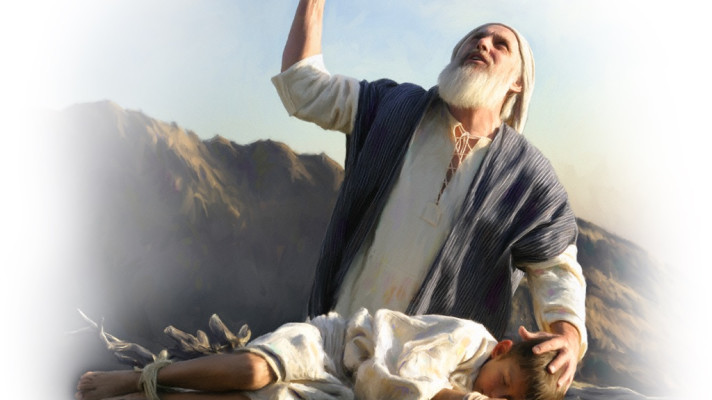
“On that day theLORD made a covenant with Abram.” (Genesis 15:18)
Abram believed God’s promise, that he would have a son and offspring, as many as the stars, even though his wife was barren and the couple were in old age. His belief in God’s word was, “accounted to him for righteousness” (Genesis 15:6). Yet Abram did show some uncertainty over the inheritance God promised him and his heritage. He wanted additional assurance. Therefore, God condescended and made a covenant with Abram. This consisted of cutting some sacrificial animals in half and laying each half on either side of a walkway.
A Suzerain-Vassal covenant was between two parties of unequal stature. The suzerain having high standing, such as a king, while the vassal held the inferior standing. To seal the deal, the vassal would walk between the halved animals. This signified his full commitment to the covenant. If he didn’t fulfil its terms, he would end up like those pieces – cut in two. Death was the penalty for noncompliance (Romans 6:23).
It was a horrifying scene. There was blood and vultures swooping down to consume the dead prey, which Abram had to chase away. With darkness and dread settling in, the drained patriarch was overcome by a deep slumber. Then came two great light sources, a burning torch and a smoking oven, passing through the separated carcasses. But as the vassal, Abram should have walked through the pieces first. Yet the Bible only mentions these two light sources walking through them.
Who is represented by the burning torch and smoking oven? God Himself (Exodus 19:18). He knew Abram could not live up to what was required of him, as none of us can because, “All have sinned and fall short of the glory of God” (Romans 3:23). Therefore, God would assume the responsibility for the covenant’s fulfilment and take the penalty for mankind’s failure (John 1:29).
The Lord “made a covenant with Abram.” The word made should be rendered cut. It is translated that way in other Old Testament passages. One such case is Daniel 9:26, which foretold the time when “the Messiah would be cutoff,” pointing to his future sacrificial death. This was fulfilled on the cross. With intense agony Jesus cried out, “My God, My God, why have you forsaken me?” (Matthew 27:46). What happened? In all eternity, the Son of God was totally one with the Father. Sin separates and as Jesus bore our sins he was violently ripped apart from the Godhead. The unimaginable happened. God was cut off from God!
This was the length in which God would go to fulfil the covenant. And he did! Abram had the promised son and through his lineage came the Messiah. Salvation came through the death and resurrection of Christ. And by it we know this: God is faithful to His promise, no matter the cost to himself.
God’s word is certain, guaranteed and proven! We can fully trust God, as did Abram. Believe He loves you and has given you salvation through Christ. And your faith will be accounted to you for righteousness.
Image used by permission of SermonView
The Shepherd was a Lamb
Pastor Michael Blog 06 Jan 2019 Michael Falzarano
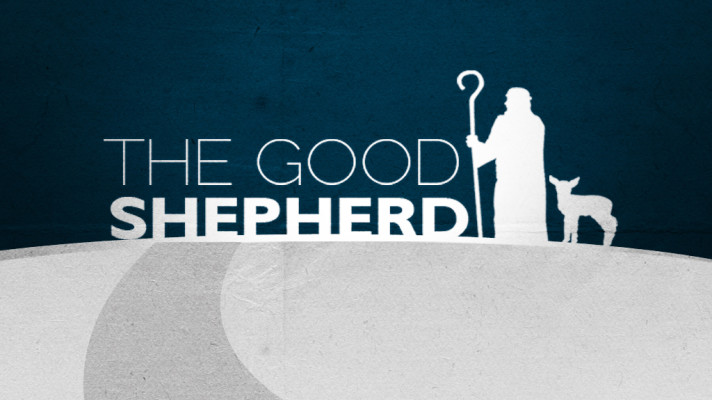
The LORD is my shepherd; I shall not want (Psalm 23:1).
Psalm twenty-three is likely the best-known psalm of the bible. In it, we find the Lord leading his children away from agitation to safety and rest. He leads them down a path filled with plush green grass and quiet waters, stilling their hearts and providing for all their needs. The path of his sheep is that of righteousness, leading them to follow his ways of holiness and truth. But of course, sheep can find themselves in extreme danger or stuck in difficult places. His sheep needn’t fear, for their shepherd is with them. His rod and staff protects from any wolf or danger. And even if the sheep should become wounded or aggravated, his oil will sooth and heal them.
What a picture! The shepherd is well suited to provide for his sheep, to protect and preserve them. He even sets up a banquet table in which the sheep can feast and fellowship with him, while their enemies are kept at bay. The shepherd promises goodness and mercy to follow us now, and the promise is that we shall always be with him. Truly we shall not want, for the Lord is our shepherd. Jesus is the Lord. He is our good shepherd (John 10:11).
There is a flip side to this that you may have failed to consider. The shepherd was also a lamb! And as a lamb, Jesus himself needed a shepherd to lead him (John 1:29; 5:30; 6:38). But what kind of Lamb was he? Jesus was a dependent and submissive one, who put his full trust in His heavenly Father. And he was content and satsified to do his will. He walked the path of righteousness, for he was a righteous lamb. He was also the suffering lamb, knowing great travail and sorrow. Jesus was also a fearless lamb, one who never lost faith in His divine shepherd, as He walked through death’s dark valley. He was a sacrificial lamb, for he gave up his life for us.
Due to Jesus’ death and subsequent resurrection, his cup of salvation overflows, pouring out its healing balm to us. Was not a banquet table set before his enemies? Yes, and we were all his enemies (Romans 5:10). But we are all invited to feast on the salvation he wrought for us. Jesus was anointed with the oil of joy (Hebrews 1:9) and this oil he wants to give us. He wants to guide us with his goodness and mercy all the days of our lives. And he will make us to dwell in his Father’s house forever.
Jesus walked our path, for the Lord our shepherd was a lamb. He is the perfect shepherd, one who can sympathise with our weaknesses and earthly plight. Therefore, he is well able to lead us. And if we follow we shall not want. We will be led to a full and abundant life. Do follow him!
Image used by permission of SermonView
Peace For Troubled Hearts
Pastor Michael Blog 28 Dec 2018 Michael Falzarano

"Let not your heart be troubled; you believe in God, believe also in Me." John 14:1
Why were the apostles' hearts so troubled? The previous chapter, John 13, spells out the reasons. Their perplexities began when Jesus unexpectedly washed their feet the night before his death. Foot washing was an unpleasant and menial task, reserved for the lowliest of servants. Prior to this, the disciples had been arguing about who would be the greatest in Jesus' kingdom (Luke 22:24). Therefore, their master stooped low to reveal a key attribute of God's kingdom: Humility!
Jesus next declares that one of the twelve would betray Him. Imagine their dismay at such a disturbing revelation. But then another troubling declaration. Peter is told he will soon disown Him. The foot washing, the predication of betrayal and Peter’s denial was enough to agitate their hearts. Yet there was more. Jesus also declared that He was leaving them! They had left all to follow Him. They had placed all their hopes in Him. Was He now abandoning them?
Jesus’ prescription for their troubled hearts was to “believe in Him.” With it He gave two grand promises in John 14. One for the near term, the other for the long term. Yes, Jesus was leaving! He would sacrifice his life for the world. But He would also rise from the grave and ascend to the right hand of the Father. And He promised to return at the end of the age (John 14:2-3). The Second Advent of Christ is the blessed hope. It is then that Jesus will gather His children of faith and take them to His heavenly abode. “And thus we shall always be with the Lord” (1 Thessalonians 4:17).
But what of the disciple’s immediate stituation, their here and now. Jesus would not leave them as orphans. He would send them the Holy Spirit after His ascension. Through the Spirit Jesus would be with His disciples (John 14:16-18). But He had to go away for this to happen. It was actually a good thing!
There may be times when we feel alone and helpless. We may feel that God doesn’t care or is far off. We may even feel He has abandoned us. Feelings are what they are. But feelings are not the guide for truth. Rather, God’s word is! And it assures us that our Saviour is always near at hand.
Ask for the Spirit daily! God is generous and longs to impart His precious gift to you (Luke 11:13). And through the Spirit you will be given peace. His peace calms the most restless storm. Trust that He is with you in the here and now! With this anchor of truth comes the other. Jesus is preparing a place for us in His kingdom and will soon return for us. Believe it! Be encouraged in this wonderful truth. Believe Him! And “Let not your heart be troubled, neither let it be afraid” (John 14:27).
Image used by permission of Sermon/View
Mary and Us
Pastor Michael Blog 14 Dec 2018 Michael Falzarano
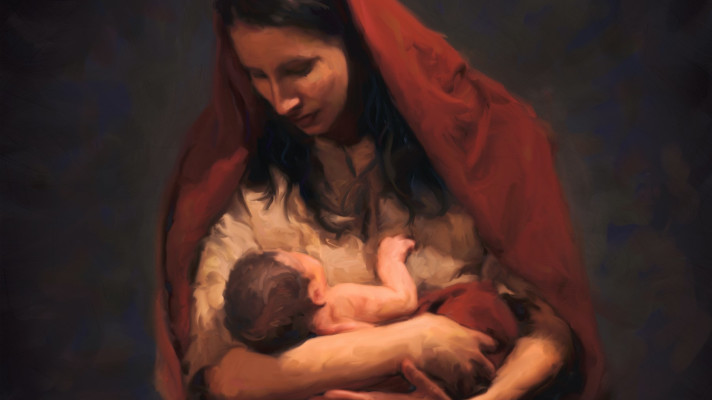
Mary said, "Behold, the bondslave of the Lord; may it be done to me according to your word." And the angel departed from her. (Luke 1:38, NASB)
What do we have in common with Mary, the mother of Jesus? I doubt any of us had an encounter with the Angel Gabriel; or had shepherds summoned to our newborn baby’s side; or had Magi come to worship our child; or had a son who walked on water, cleansed lepers, restored sight to the blind, healed the sick and raised the dead. Mary did however. Her son lived a sinless life, was crucified, rose from the dead and then ascended into heaven. Mary’s life was extremely unique!
Nonetheless, we do have a spiritual parallel to Mary. The seed of God was conceived in her through the Holy Spirit (Luke 1:31-35). Likewise, the seed of God, His “living and enduring word” (1 Peter 1:23), is implanted in us through the Spirit when we put our faith in Christ. We are born from above and become a new creation as He comes to dwell in us. This is where it begins. But after conception there must be more, there must be growth.
The fetus in Mary took about nine months to mature. This was a process, day-by-day, hour-by-hour, and moment-by-moment, in which the Christ baby was developing within Mary’s womb. Jesus is also to be formed within the believer. Paul sought this for his wayward brethren at Galatia, “My children, with whom I am again in labor until Christ is formed in you” (Galatians 4:19).
God wants the character of His son to be developed in the Christian’s life. If there is no miscarriage or the process is not aborted, the Christian will be led to spiritual maturity. However, as Mary discovered, the journey is fraught with trials. She was willing to bear them all so God’s plan would come to fruition. Likewise, God will mature us if we keep our eyes on Christ. And in the end, we will be delivered!
The baby Jesus was delivered, though in a most unlikely place, in a lowly stable. It is in the lowly stable of the heart that God’s word matures us, as His character grows within. And God has promised us that there is a due date, a time when Jesus will return to deliver His church. It is then that our bodies will be transformed, but His character is to be developed in us now, as we grow in faith and draw ever closer to him. We can know, “that when He appears, we will be like Him” (1 John 3:2).
Like Mary we must allow Jesus to be conceived in us, allow His character to form in us, and at last be delivered by Him when He returns. It is all a process of faith. What was Mary’s response to God’s word? She said, “May it be done to me.” What do you say?
Image used by permission of SermonView
Victory From Defeat
Pastor Michael Blog 07 Dec 2018 Michael Falzarano
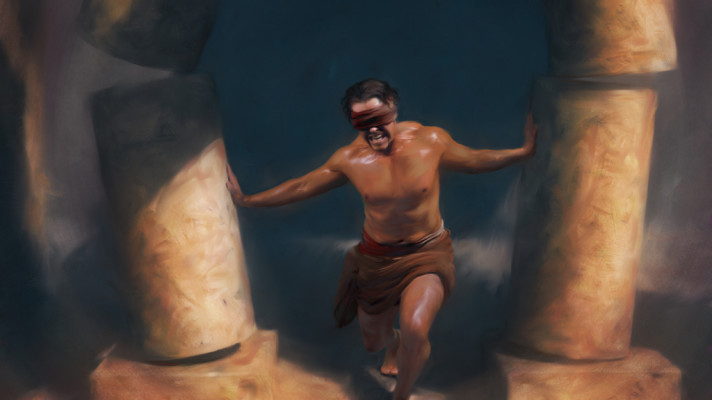
Samson’s birth was miraculous, being born of a barren woman. His mission was incredible, to deliver his people from their oppressors. There was his Nazarene vow, to serve God and live a life separate from the world. And he possessed a supernatural strength; he once slew a thousand men using only the jawbone of a donkey. From where did his amazing strength derive, from his uncut hair? Actually his power came from the Spirit, his hair being a sign of his covenant with God. (Judges 13:2-5, 24,25; 14:6,19; 15:14,15).
Yet despite all of God’s blessings this strong man repeatedly succumbed to moral weakness. One can be the physically strongest person on the planet, but without a daily connection to God one can become the spiritually weakest. Using the siren Delilah, the Philistines lured Samson into a fatal trap. Delilah seduced him and in his vulnerability he exposed the secret of his power, his uncut hair. The enemy cut his hair as he slept and his strength ebbed away. The Spirit had to let him go, as Samson had wilfully severed his covenant with God, through unbelief and self-sufficiency. The enemy could now blind and bind him. (Judges 16:16-21).
Yet Samson’s name is recorded among God’s faithful (Hebrews 11:32-34). How can this be? Because it was in defeat that Samson found victory. At rock bottom his eyes shifted upwards towards God and in his blindness he gained sight. Samson saw his need and came to know God alone was his strength.
The Philistines put the bound Samson on display in their temple, mocking him and the God of Heaven. But Samson’s hair had grown back in time and with it his faith in God. He was chained to two weight bearing pillars. With outstretched arms and great force, he pushed the pillars apart causing their fall. With the temple’s collapse, came the demise of many Philistines, as well as his own. The Philistine’s victory turned into defeat, while Samson’s defeat turned into a final triumph. (Judges 16:22-30).
Is this not a shadow of the cross? For on the cross Jesus outstretched his arms to topple the twin pillars of sin and death? Although death pulled Jesus into its bosom, his subsequent resurrection brought triumph from apparent defeat. Of course Jesus’ victory was ensured due to his sinless life, while Samson’s defeat came as he succumbed to the wiles of the flesh. But have we not all “sinned and fall short of the glory of God” (Rom. 3:23,24). Indeed! But the good news is that Jesus paid the penalty for our sins. And when we put our faith in Him, His meritorious life is credited to us; His victory becomes our victory.
Even though late in Samson’ life, it was none too late, nor is it for any of us. Through the Spirit, God will give us strength to overcome our weaknesses. But one must turn away from the darkness and turn to Christ. If you do, you too will prevail.
Image used by permission of Sermon/View
Nail Prints
Pastor Michael Blog 27 Jul 2018 Michael Falzarano

Then Jonathan and David made a covenant, because he loved him as his own soul. And Jonathan took off the robe that was on him and gave it to David, with his armor, even to his sword and his bow and his belt. (1 Samuel 18:3,4, NKJV)
The Bible tells us that, “The soul of Jonathan was knit to the soul of David, and Jonathan loved him as his own soul” (1 Samuel 18:1). Jonathan had a heart of self renunciation, putting David and his needs before himself. His heart was tied to David’s heart by a cord of unselfish love. In this Jonathan fully committed himself to his friend, making a lifelong covenant with him. Jonathan’s commitment was first to God, then to David. So our commitment should be. First to God, then to others.
Jonathan’s commitment led him to have a deep sense of loyalty to David. His father Saul was king. Saul was so jealous of David that he unjustly sought to kill him. Jonathan loved and honoured his father. Because of this, his faithfulness to David was tested. Yet Jonathan followed the right path. He pledged his loyalty to David, even if it cost him his relationship to his father. In turn Jonathan felt the wrath of Saul, who “Cast a spear at him to kill him” (1 Samuel 20:33). The devil tempted Jesus to be disloyal to his heavenly father after his baptism, to “Fall down and worship” him (Matthew 4:9). In doing so he dangled the possibilty of avoiding the horrors of the cross. But no hardship or pain swayed the course of Jesus. He was loyal to God and to those he came to save. Jonathan’s relationship to David also showed an unwavering loyalty.
True commitment and loyalty involves sacrifice. Jonathan’s love for David cost him much, but much he was willing to pay. Jonathan was in line to be the next king, but David had been annointed by the prophet Samuel for that position. By protecting David from Saul’s wrath, Jonathan was honouring God. He also was forfeiting his opportunity to become king, as Saul himself strongly reminds him (1 Samuel 20:31). Yet Jonathan surrenders his robe, armor, sword, bow and belt to David. In so doing he surrendered his rights. Jonathan sacrificed his opportunity for worldly gain and honor. He died on the battlefield, whereas David went on to become king.
What kept Jesus on the cross? Simply put, it was nails! At least three huge nails went through his hands and feet, holding him to that tree. But those physical nails were not strong enough, for with divine power he could have easily come off that cross. What actually bound Jesus was his love, expressed through his commitment, loyalty and sacrifice! Love is not merely an emotion; it is wedded to selfless actions. Jesus’ self-sacrificial actions proved his love. Jonathan’s actions proved his love for David, and for God.
These three nails must penetrate more than the wood of the cross. They are meant to penetrate your mind and heart. Pray they do so! And pray that others will see these nail prints through your actions.
Job Meets God
Pastor Michael Blog 29 Jun 2018 Michael Falzarano
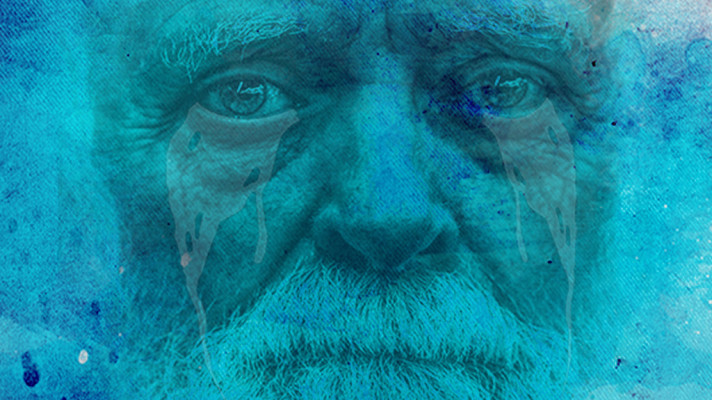
Indeed we count them blessed who endure. You have heard of the perseverance of Job and seen the end intended by the Lord--that the Lord is very compassionate and merciful. (James 5:11, NKJV).
First Job lost his wealth. Then he lost his 10 children, who died in a tragic storm. Next he lost his health, being struck with painful boils from head to foot. What’s more, instead of comforting Job, his three friends only added to his misery. They excoriated Job, telling him it was his hidden sin that caused his woes. Their theology was black and white: God prospers the good and afflicts the bad. Their remedy for Job was to come clean and confess his grave sin.
Job found himself in a fog, a thick haze, and in such came the why and where questions. Why me? Where is God? Jesus himself cried out from the cross a why question: “Why have you forsaken me?” (Matthew 27:46). Where was the Father? The feeling of divine abandonment is the worst of all suffering. It can dispel any and all hope. Yet Jesus’ faith saw that God was in the darkness. Job’s faith looked to God in the thick fog.
Although Job didn’t realize it, Satan was the one afflicting him not God. Satan claimed that Job only followed God for the blessings he received from his hand. If he suffered he would then curse God (Job 1:9-11). Job may have struggled, questioned and misunderstood, but he never gave up on God. He saw the light flicker in the distance, which even death would not extinguish. Job knew he would come to see his redeemer (Job 19:25,26).
It is true that God allowed the turmoil to enter Job’s life. It would refine him further and bring him closer to his side. But he also set a hedge to protect Job’s life, thereby limiting Satan’s rein. And it is well to remember that, “No temptation has overtaken you except such as is common to man; but God is faithful, who will not allow you to be tempted beyond what you are able, but with the temptation will also make the way of escape, that you may be able to bear it” (1 Corinthians 10:13).
God’s people at the end of time will suffer a horrific tribulation, as did Job. And as Job was declared blameless so will they be called blameless (Job 1:1; Revelation 14:5). As Job endured so will they endure through the great turbulence at the world’s end (James 5:11; Revelation 14:12). And like Job, they will vindicate God’s character and truth, exposing Satan’s barren lies. Job was fully restored at the end of his ordeal; likewise God’s people will be restored after their tribulation.
A mountain requires patient endurance to scale it. It’s the fantastic view at its peak that makes the hardship of the climb worth it. Through the suffering Job got to the top and got to see God’s glory for himself, "I have heard of You by the hearing of the ear, But now my eye sees You” (Job 42:5). The saints at the end will behold God’s glory as well, seeing him face to face (1John 3:2). Hold fast through your trails! And you too will behold his glory.
Image used by permission of SermonView
Why Hide?
Pastor Michael Blog 17 Apr 2018 Michael Falzarano

And they heard the sound of the LORD God walking in the garden in the cool of the day, and Adam and his wife hid themselves from the presence of the LORD God among the trees of the garden. Genesis 3:8 (NKJV)
After their disobedience we find Adam and Eve hiding from God. We also find them making coverings of fig leaves to conceal their nakedness (Genesis 3:7). We also find them blaming others for their sin (Genesis 3:12-14). Instead of throwing themselves on the mercy of God; they ran, they hid, and they denied. Why?
The first couple was perfect, living in a world where only selfless love dwelt. They loved each other and even more they loved God, daily welcoming His presence with joy. But now they ran and hid from Him, because their sin had changed them and changed their perception of God. Instead of seeing God as benevolent and loving, they now saw Him as a harsh judge, coming to punish. After all, God forewarned that if they ate from the tree of good and evil they would die (Genesis 2:17). They ate! Now they must have thought God was coming to kill them.
Due to sin, we are suspicious of God, thinking his motives are to do us harm. So we run! We run because of fear, guilt and shame. So we hide! We hope to cover our misdeeds and evade God. We hide by trying to shift the blame away from ourselves unto others. We hide anywhere we can: in clubs, in sporting events, in entertainment and the arts, in our daily work, in relationships, in drug houses and taverns. We can even hide in churches and in religion. We can try to cover our naked souls with fig leaves of good deeds. But none of these cover our sin! Adam and Eve were still naked!
Why did God come to the garden after they sinned? Did He come to condemn? No! He came to save! “God sent his Son into the world not to judge the world, but to save the world through him.” (John 3:17)
God came to cover their nakedness with animal skins (Genesis 3:21)? This showed a Saviour would be sacrificed for their sin, dying in their stead. Sin leads to pain, brokenness, separation, fear, guilt and death, whereas the gospel leads to love, life and liberty. The sacrificed animal pointed to the fact that God would send His Son to bear our sin and its penalty. Through Christ we have forgiveness and reconciliation with God. Our guilt is removed, our nakedness covered by His righteousness.
There are many ways to hide, but only one way to be found. Confess your sin and receive the salvation of God through Christ. Stop running! Stop hiding! God is love; He changes not (1John 4:8; Malachi 3:6). He comes not to harm, but to save.
Lets See This Thing
Pastor Michael Blog 18 Dec 2017 Michael Falzarano
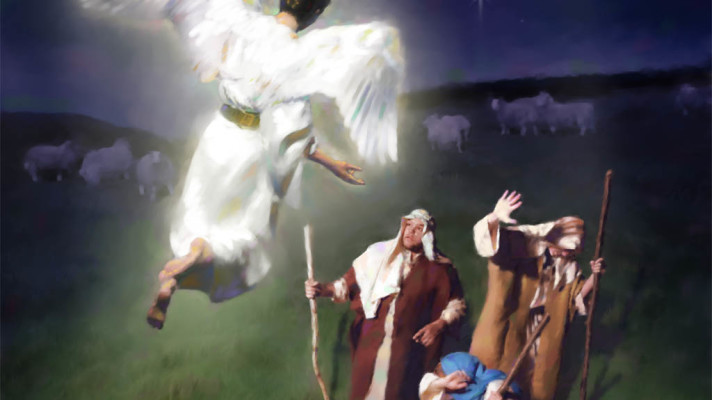
So it was, when the angels had gone away from them into heaven, that the shepherds said to one another, "Let us now go to Bethlehem and see this thing that has come to pass, which the Lord has made known to us. And they came with haste and found Mary and Joseph, and the Babe lying in a manger.” (Luke 2:15,16)
A most incredible scene took place on those hills outside of Bethlehem. A batch of shepherds were tending their sheep when, all of a sudden, heaven’s light and warmth pervaded their mundane labors. An angel of the Lord appeared and told them the Savior was born. Their terror turned to wonderment and their response was, “Let us now go to Bethlehem and see this thing that has come to pass”.
What thing did they see? They saw the closeness of God (Luke 2:10, 11). God may have seemed light years away, untouchable, abstract and even uninterested to those shepherds as they toiled beneath the dark sky. But in actuality he was incredibly near. Matthew uses the name Immanuel for the Babe, meaning “God with us”. They saw God in the flesh, “the Word became flesh and dwelt among us” (John 1:14). God pitched his tent in humanity in order to dwell near us. The shepherds could touch him, he came that close. Bethlehem means house of bread and Jesus was the living manna that came from heaven. The shepherds saw this thing.
What thing did they see? They saw the impartiality of God. Shepherds were of a low order, a poorer class, and many despised them and their trade. Yet in the Scriptures God himself is compared to a shepherd over his flock. And it was to shepherds that God announced the birth of Jesus. To them was given the privilege and honor of seeing the newborn Savior. God is not partial to social status, to wealth, to occupation, to race, nationality, age or gender (Romans 2:11). The shepherds saw this thing firsthand.
What thing did they see? They saw the sacrifice of God. They beheld the newborn baby not covered with silk and jewels, nor settled in a soft royal bed, nor safely nestled in a king’s palace. No religious, political or royal elites were beside the mundane manger; instead it was shepherds. Was Jesus dressed in royal garb? Nay! He was dressed in swaddling cloths, the wrappings of poor babies. Although “He was rich, yet for your sakes He became poor, that you through His poverty might become rich” (2 Corinthians 8:9). Jesus left the Universe’s throne for a stall and a manger. This thing the shepherds saw. And so shall we, if we invite Christ to be born within the stable of our hearts.
What thing did they see? They saw Mary, Joseph and the Babe lying in the manger. In this they saw God’s salvation, as they saw the Savior himself (Luke 2:11). The word savior (sōtēr) means one who rescues, a deliverer. They saw the one who would deliver them from their sin (Matthew 1:23). They saw and believed! And what they saw, they made known to others with enthusiasm (Luke 2:16-18). Bethlehem is the house of bread and the house of bread is God’s word in which we feed. Go to Bethlehem daily and see what the shepherds’ saw, the Savior and the salvation of God. But do not keep to yourselves this thing you see.
Image used by permission of SermonView
Rahab and Faith
Pastor Michael Blog 10 Dec 2017 Michael Falzarano
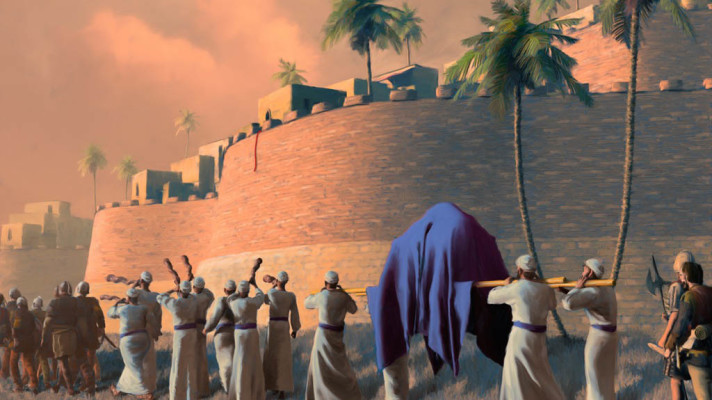
By faith the walls of Jericho fell down after they were encircled for seven days. By faith the harlot Rahab did not perish with those who did not believe, when she had received the spies with peace. Hebrews 11:30, 31
Rahab was an innkeeper in the ancient city of Jericho. The Scriptures also point out she was a harlot. She was from a pagan nation, the Canaanites, who were idolatrous, violent and proud. She came from the other side of the tracks, a sinner, estranged from God and his people (Ephesians 2:11, 12). Yet we also find her name listed with the giants of Old Testament faith. How did that happen?
We read in Joshua 2:8-11 that Rahab heard and believed? Faith comes by hearing, and hearing by the word of God (Romans 10:17). What did she hear? She heard about the power and greatness of the true God. If God has the power to part the Red Sea, then he also has the power to save sinners. But Rahab did more than agree to the truth she heard, she also put that truth into action. She hid the two Israelite spies that had entered the city. This was no small thing for if caught Rahab could have lost her life. In spite of the risk, she heard the word of God’s messengers and acted upon it.
They told her to hang a scarlet cord out of her window. This she did. In the Exodus, it was the blood of the lamb applied to their doorposts that spared the believer’s firstborn. The blood pointed to the Lamb of God, the Christ who would come and deliver from sin. The red cord meant she would be spared, not only from the destruction of Jericho but also from sin itself. It is faith in the blood of Christ that delivers, and it's a faith that takes action.
Endurance is another aspect to Rahab’s faith. The spies told her to gather her family into her home, to stay in that protected space, and to patiently wait for deliverance. The waiting must have seemed like an eternity. But neither she, nor her family left that home, even when Jericho’s walls started crumbling. So it shall be at the end (Revelation 14:12). God’s people will have faith, the faith of Jesus. God’s people will have a faith that acts, they will keep the commandments. God’s people will endure; here is the patience of the saints. The one who endures to the end, he will be saved (Matthew 24:13).
Jericho was under a ban, in Hebrew a “herem” (Joshua 6:17). This meant it was cursed and devoted to destruction. However the city’s precious metals were to be put into the Lord’s treasury. But the real treasure that day was Rahab and her family. So it shall be in the end. God is longsuffering wanting all to be saved (2 Peter 1:9-12). But not all put their faith in him. Christ took sin’s curse upon himself (Galatians 3:13, 14). He was devoted to destruction in order to pay the wages for our sin, that we could be delivered to the treasurer of the Lord forever. The elements will burn up at the end, but God’s people of faith will be fully delivered.
True faith believes in the Lord and His power to save, it acts on God’s truth, and preserves through the battles and storms. Rahab had such faith. She was tremendously blessed for it, even having the Messiah come through her lineage (Matthew 1:5, 26). Have like faith! You too will be eternally blessed.
Image used by permission of SermonView
From The Pit To The Palace
Pastor Michael Blog 03 Dec 2017 Michael Falzarano
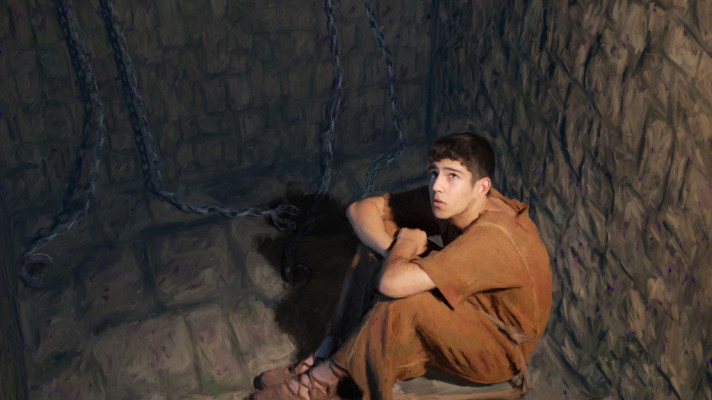
Joseph said to his brothers, "Please come near to me." So they came near. Then he said: "I am Joseph your brother, whom you sold into Egypt. But now, do not therefore be grieved or angry with yourselves because you sold me here; for God sent me before you to preserve life. (Genesis 45:4-5, NKJV)
Joseph’s father, Jacob, favoured him over his many brothers. Their jealousy deepened after his father made him a special coat. Joseph not only flaunted the coat, but also shared his prophetic dreams to his brothers, that they would become subservient to him. Their reaction was over the top, as they thought to kill Joseph. They did relent some, throwing him into a pit instead. Subsequently they sold him into slavery and Joseph became a slave in Egypt. There, his master cast Joseph into prison after his wife falsely accused him of sexual assault.
Jospeh was forsaken by family, forced into slavery, falsely accused, and abandoned in the bowels of a dingy prison. Bitterness and anger could have been a pit that swallowed him, but instead Joseph made God’s love his citadel. After more than a dozen years of abuse and neglect, Joseph still persisted in his fidelity to God. And in miraculous fashion God delivers him from the dungeon, placing him in high position in Pharaoh’s court.
Joseph providently is reunited to his brethren, where His tears gushed, as did his forgiveness. This some 22 years after being sold into slavery. Joseph reframed the past in light of God’s grace. The brothers meant ill towards him. God used it for good. Joseph was now in a position, during a severe famine, to deliver his people and bless the Egyptians.
From this we can learn much on true forgiveness. It is not about forgetting past wrongs done to us but reframing them in a constructive way. God is a great economist and doesn’t waste even our dark experiences. Through them we are matured and better equipped to bless others. Forgiveness is letting go of the wrongs we suffered and letting God “work all things together for good” (Romans 8:28).
There is another important point in this Scripture. Joseph tells his brothers not to be “grieved or angry with yourselves”. If you have wronged any you can humbly go before God and receive his forgiveness (1 John 1:9). You can seek forgiveness from the one you wronged, if possible. But you can also forgive yourself, be not “grieved or angry with yourselves”. Are you greater than God? Of course not! If he forgives you, who are you to not forgive others in turn. Even if that person should be yourself.
When Jacob died the brothers became concerned that Joseph’s forgiveness had an expiry date. They begged him for renewed forgiveness, believing his prior forgiveness was for the sake of their father, who now had died (Genesis 50:15-17). This must have grieved Joseph, as they failed to embrace his word and heart.
When God forgives us in Christ, we are truly forgiven. Embrace that and don't look for an expiry date.
Used by permission of SermonView
A New Story
Pastor Michael Blog 13 Nov 2017 Michael Falzarano
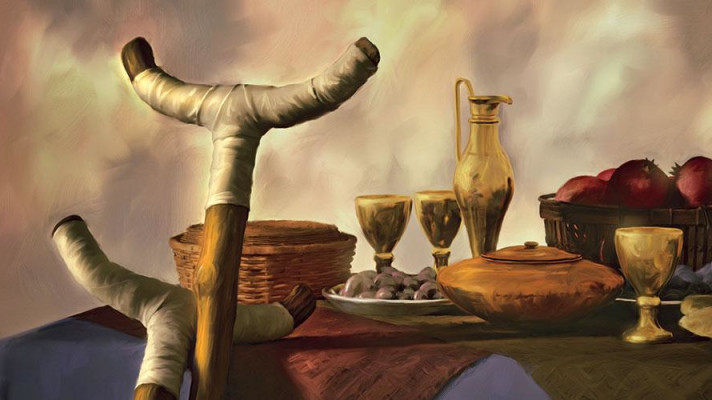
“Then the king said, "Is there not still someone of the house of Saul, to whom I may show the kindness of God?" And Ziba said to the king, "There is still a son of Jonathan who is lame in his feet." 2 Samuel 9:3 (NKJV)
Mephibosheth needed a new story. He was identified with a wretched deformity, that of lame feet. He was the son of Jonathan, the grandson of King Saul. But at the tender age of five, both his father and grandfather were killed in battle. In fear his nurse hastily fled with him and “he fell and became lame” (2 Samuel 4:4). Mephibosheth lost his inheritance, his home and his family. He ended up with scarce more than crippled feet. He most likely lived in fear that David might eliminate him as an heir to the throne. Mephibosheth had a distorted picture of what David was all about.
Many years later David sought to honour his long lost friend Jonathan by showing kindness to a descendant. David’s servant Ziba said there was one alive, one who had “lame feet.” How sad someone becomes identified by a deformity! Mephibosheth lived in isolation, his feet became the symbol of his miserable lot.
Mephibosheth was brought before the king whom he nervously prostrated before, calling himself a “dead dog”. His shame and dreadful state is laid bare before David. But David showed no ill towards him, instead Mephibosheth receives an inheritance once lost. David gives him a new story. He goes from an orphan to the status of the king’s son. He goes from poverty to plenty, never to lack sustenance again.
By nature we all have been crippled by sin. Adam fell and lost the inheritance God had given him. As descendants of Adam we stand spiritually impoverished, crippled by fear; fear of a God we don’t know or understand. But God looks not to harm us but rather to bestow his kindness and mercy upon us. God invites us to live with him eternally, as sons and daughters.
Mephibosheth’s fortunes could not have been better due to David’s kindness. But still he had those lame feet to deal with. However, we read that he came to “eat continually at the king’s table” (2 Samuel 9:13). The table was a place of honour and fellowship. It gave him free access to the king’s court. It also meant that his feet would be hidden beneath that table. The king would be looking into his eyes, not at his feet or his past. The Hebrew name Mephibosheth is composed of pa’ah (to shatter or dispel) and boseth (shame). It means therefore dispelling the shame. The curse and shame was gone! Mephibosheth had a new life and a new story.
Jesus took our curse on the cross (dispelling our shame) and offers us his righteousness (2 Corinthians 5:21). By receiving him we become sons and daughters of God (John 1:12), fully pardoned, bestowed with spiritual abundance (2 Corinthians 8:9). God’s kindness is found in Christ. In him we too have a new story.
Religious Liberty
Pastor Michael Blog 06 Nov 2017 Michael Falzarano
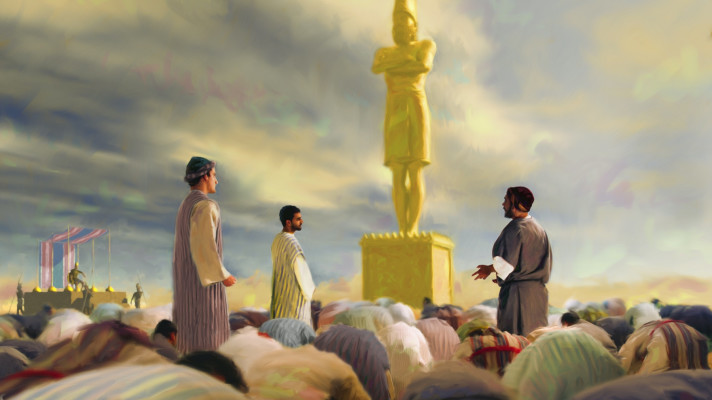
Then a herald cried aloud: "To you it is commanded... you shall fall down and worship the gold image that King Nebuchadnezzar has set up; and whoever does not fall down and worship shall be cast immediately into the midst of a burning fiery furnace." (Daniel 3:4-6)
Where we find the union of state and religion we most often find force used to violate human conscience. The portrayal of Babylon in the Old Testament is a case in point. The babylonian monarch Nebuchadnezzar had jurisdiction over the political and religious rights of his subjects. In Daniel 3 we find the king setting a decree that his subjects had to bow down before a golden image he had constructed. Death was the punishment for non-compliance. There were three Hebrew captives who refused to violate the second commandment and give worship to anyone or anything other than the true God. This infuriated the king who ordered their death. By God’s grace however they were delivered.
Liberty of conscience is a right given by God. No monarch, no government, no state, no magistrate or other individual, should have jurisdiction over religious conscience. Jesus well expressed this in the New Testament when he said, “Render unto Caesar what is Caesar’s and render unto God what is God’s” (Luke 20:25). Caesar has the right to make laws for the good of the state and to protect its inhabitants, but he has no right to make laws that violate an individual’s religious conscience. Worship is in the sole domain of God and individual liberty.
When church and state combine fear and intimidation tends to be used to accomplish its goals. We see this in the medieval age, after the Christian Church had apostatized. The church, lacking the power of God, sought the power of the state to conform others to its practice and beliefs. This led to great persecution, even the slaughter of millions. We see the same in our day, when governments or potentates demand conformity to the religion of the land. Invariably the minorities, which worship otherwise, are persecuted. The American government was established to protect the minority from the tyranny of the majority. The separation of church and state was pronounced, in that one could freely worship or not worship as they are so led. The government would not establish a state religion and would not dictate or coerce any to follow a prescribed worship or religion.
The book of Revelation forecasts a time when the church will again fall away from biblical truth and God’s ways. It will use the state to enforce worship, as it deems proper. We find in Revelation 17:3 a woman sitting on a scarlet beast, denoting a church and state configuration. In bible prophecy a woman symbolizes God’s people, a harlot his church in apostasy (Ezekiel 16:15, 16). Likewise a beast symbolizes a power that rules (Daniel 7:23). This babylonian like entity enforces its religious decrees under the might of economic boycott, persecution and even death (Revelation 13). Its goal is not true worship of God, which springs from the soul, but a worship of itself springing from the dictates of its church-state construct.
God’s way is not so! God operates under the persuasion of love and does not compromise free will. He reveals himself to us and gives us reconciliation and forgiveness through the gospel of Christ’s redemption. God asks for entrance into our lives, but does not force it (Revelation 3:20). Love demands free will and choice, and God is love (1John 4:8).
We too have fallen for the devil’s ploy if we try to manipulate or coerce the conscience of others. Rather we are to woo others through love and reason. The actions of Babylon showed they opposed God and the liberty of individual conscience. Let our attitude and actions reveal otherwise.
Image used by permission of SermonView
Gate of Compassion
Pastor Michael Blog 31 Oct 2017 Michael Falzarano

Now as He approached the gate of the city, a dead man was being carried out, the only son of his mother, and she was a widow; and a sizeable crowd from the city was with her. When the Lord saw her, He felt compassion for her, and said to her, "Do not weep." (Luke 7:12-13, NASB).
Jesus came to a place called Nain. Although Nain means pleasant, it was anything but pleasant this day. A funeral procession was proceeding out of the city’s gate accompanied by a large crowd. A large crowd was also following Jesus and his disciples into the gate. The two sizeable groups intersected, forming a bottleneck of human traffic. Here Jesus, in timely fashion, meets a grieving mother at the gate of her suffering. Likewise he sets up divine appointments for his people, so he can comfort the grief-stricken through them.
The Scripture says Jesus felt compassion. The scene was gut-wrenching. A mother had lost her only son. She was a widow, meaning she had previously buried her husband. Not only did her losses create a tremendous void relationally, but also her security was gone. The most vulnerable in that society were the orphans and widows, and without her husband or son great hardship would surely befall her. This woman lost everything, perhaps even her hope. However Jesus was there! Although we may not realize it, God is the closest in the darkest hours. “In all their affliction he was afflicted,” being “grieved by their misery.” (Isaiah 63:9; Judges 10:16). God feels our grief and is greatly moved by it.
There was a contest that sought the child who had shown the most compassion. The winner was a four-year-old boy. His elderly neighbor had recently lost his wife of many years. As the old man sat in his chair on his porch the lad rushed over and climbed up onto his lap, sitting there for sometime. When the four-year-old returned home his mother inquisitively asked what he said to the grieving widower. The child replied that he said nothing to the aged man; he just helped him cry! Let us share God’s compassion to others. In this we may lessen his tears.
Jesus next touches the dead son’s coffin. The Greek word translated as touch means to fasten to, indicating he grasped the open casket. This abruptly halts the death train. The Law of Moses stipulated that by touching it Jesus would become ceremonially unclean. What an incredible picture of the cross, where Jesus “tasted death for everyone” and he “who knew no sin was made to be sin on our behalf” (Hebrews 2:9; 2 Corinthians 5:21). Jesus took all our uncleanness upon himself (our sin, guilt and condemnation). In turn he gives us his life and righteousness, received by faith. Because of his atoning sacrifice and resurrection, Jesus also purchased the right to wake his children who slumber in death’s cradle.
The blessed hope is the Second Coming of Christ (Titus 2:13). “The last enemy that will be abolished is death” (1Corinthians 15:26). At Nain Jesus gives us a glorious glimpse of this. He commands the lifeless son to rise and his life is miraculously restored by the power of Jesus’ word. Jesus then gives the risen son back to his mother. An astonishing reunion! Likewise, it will be when Jesus returns. Until then be compassionate and comfort one another with this hope (1Thessalonians 4:13-18).
Image used by permission of SermonView
A Fire In Our Hearts
Pastor Michael Blog 09 Oct 2017 Michael Falzarano
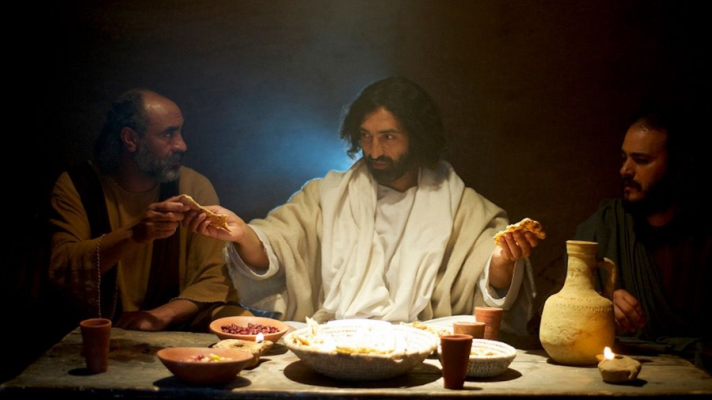
They said to one another, "Were not our hearts burning within us while He was speaking to us on the road, while He was explaining the Scriptures to us?" (Luke 24:32, NASB)
Two disciples of Jesus were walking from Jerusalem to Emmaus on Sunday afternoon. They knew of Jesus’ mighty miracles and His heavenly teachings. However their faith, the ministry of Christ and the promises of God’s word now seemed hollow. Jesus had been horribly crucified and laid lifeless in a sealed tomb. Therefore they walked with barren hearts, their hopes had been horribly shattered on the rocks of discouragement.
That is until one in human flesh started to walk alongside them. Unbeknownst to these two, it was Christ, not dead in a shut up tomb, but fully alive and glorified. But Jesus did not reveal Himself; instead He fills their empty hearts with Old Testament prophecies concerning the Messiah’s death and resurrection. The same prophecies we can lay hold of if we are willing to dig into the Bible and invite Jesus to be our guide.
The two disciples arrived hours later at their home in Emmaus where they were confronted with a choice. Do they invite Jesus in or allow Him to go His way? The Words of Holy Script had moved them to yearn for more. Yet Jesus didn’t declare that He was the risen Christ. No! It was through the Word of God that they, and we, must apprehend the personage and power of Christ. And it is not enough to read about Jesus, we as they, must also invite Him in to dine with us. It is through the breaking of bread that His scars are known (Matt. 4:4). This is the wisest choice any can make, to invite Jesus into the dining chambers of their hearts. This is how we come to discern who He truly is.
The word burned in these two disciples’ hearts, made operatable through a personal fellowship with the living Word, Jesus. Their discouragement became a vanquished foe, replaced by hope, joy and assurance. Once it did, the flame burning within spread out to others, as they ran back to Jerusalem to tell them the good news. When received, the fire cannot be contained, it must be spread. Study God’s word daily and invite the Spirit in. Your hearts will burn within! And others will then be able to warm themselves by the blaze.
Image used by permission of lumo project
Stop The Bleeding
Pastor Michael Blog 09 Oct 2017 Michael Falzarano
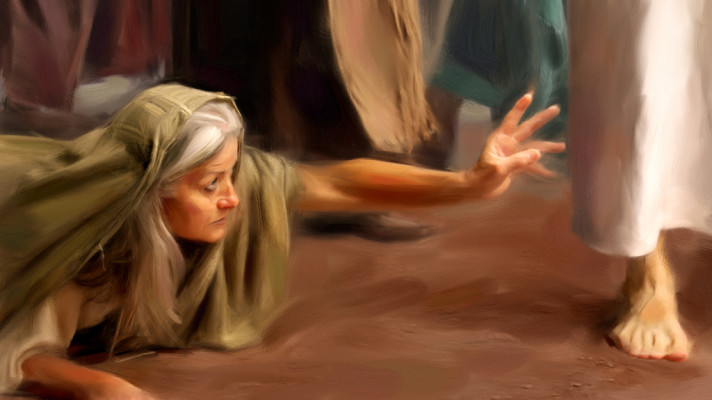
"And a woman was there who had been subject to bleeding for twelve years, but no one could heal her. She came up behind him and touched the edge of his cloak, and immediately her bleeding stopped." Luke 8:43-44 (NIV)
Barriers faced this woman in her quest for healing. Doctors who did her no good depleted her funds (Mark 5:26). Her strength and hope were also depleted due to 12 years of haemorrhaging. Perhaps worse was the social stigma, for the Law of Moses pronounced her "unclean” (Lev. 15:25,26). Most would have shunned her touch. Any physical contact would have meant contamination and the need for purification.
Another barrier was the “pressing” crowd (Luke 8:42). The same Greek word for “pressing” is translated as "choked" in Luke 8:7, speaking of the thorns choking out the seed. The crowds choked out this woman's direct access to Jesus, as does the crowds in our day. Yet faith fixes its eyes on Jesus, not on the obstacles. Propelled by faith, she went through every barrier.
To the puzzlement of His listeners Jesus asked, “Who touched me,” as many had pressed against Him. But the woman’s touch was deliberate and genuine, not random as others. With concealed presence she stooped low and touched Jesus’ hem. On the garment’s corners were tied tassels with a blue cord (Num. 15:38,39), signifying obedience to the law. What a picture of the divine exchange! Her contact defiled Jesus according to the law, but his contact brought her His perfect obedience. His righteousness! Jesus took our sin and in exchange we receive his purity (2 Cor. 5:21). She is given a new life. The bleeding stopped!
It is important to note that Jesus was heading to Jerusalem (Luke 9:51), to the cross. Why? To bleed! His blood would be shed for this woman. He would take her sin, guilt and punishment. This is true of all, as Jesus bled and died for all. And like this woman we can lay hold of Jesus and all that He offers. We need only reach out and touch Him by faith. His life and power will save and heal us.
Are you bleeding? You may be bleeding physically, mentally, emotionally, socially, relationally or spiritually. Regardless of the cause, touching Jesus by faith is the answer. Let no barrier or excuse impede you. Reach out today and touch your Saviour. He will give you a new life. Only He can stop the bleeding.
Image used by permission of SermonView
The Lord is a Warrior
Pastor Michael Blog 09 Oct 2017 Michael Falzarano

Now I saw heaven opened, and behold, wa white horse. And He who sat on him was called xFaithful and True, and yin righteousness He judges and makes war. (Revelation 19:11)
In Revelation, Jesus’ divinity flashes forth. He is part of the Godhead (Revelation 1:4, 5) and John falls down before Him like a dead man (v. 17). In Revelation 5 we see Jesus installed as our high priest. As the lamb He was slain for the sins of the world, but we see Him alive, having ascended before the throne. He provided our atonement when He first came and will return as our king. Jesus is truly worthy of our worship (Revelation 5:9. 12).
There is another aspect of Jesus that we don’t often consider. In Rev. 19:11 we see a rider on a white horse coming to wage a righteous war. Who is the rider? He is the Word of God (Revelation 19:13; John 1:1) and the King of Kings (Revelation 19:16; 17:14). It is clearly Jesus at His second coming. He came the first time riding on a donkey, a beast of burden, symbolising servanthood. But at the Second Coming He rides a white horse symbolising victory, as the white horse was rode in triumph after conquest.
Notice His robe is dipped in blood (Rev. 19:13). Whose blood is it? Three options: His blood, the blood of His saints, or that of His enemies. Which is it? Isaiah 63:1-3 nails it down: It is the blood of His enemies! His robe is flowing over the horse and as He rides through the winepress its bottom gets dipped in their blood (Revelation 19:15).
Jesus will return not only as the King of kings, but also as our warrior. Why? According to Revelation the church will have its greatest persecution at the end of time. It will face certain destruction. Like the Exodus, God’s people will be boxed in, ready to perish before their enemies. But in the Exodus God swept open the Red Sea and delivered Israel and destroyed Pharaoh’s army. He will do similarly at the end of time! Jesus will return to deliver His bride, the church, and destroy those who are set to destroy her.
Don’t you love the fact that God has a dramatic flare! It is like the old silent films where the hero saves the woman he loves, just in the nick of time, right before the train would run over her. Jesus will deliver His people likewise, in bold fashion.
The Lord is a warrior, the Lord is his name (Exodus 15:3). Jesus is a warrior; Jesus is his name! He is our saviour, our lord, our high priest and king, and He is our warrior! He is our warrior not only in the last battle but in every battle that we face. Therefore, do not fear or labor to fight the battles yourself. Rather, victory comes as you let Jesus fight them for you. He will always win. Surrender yourself struggles to Jesus. And don't lose faith!
Image used by permission of SermonView
The Need For Oil
Pastor Michael Blog 03 Sep 2017 Michael Falzarano
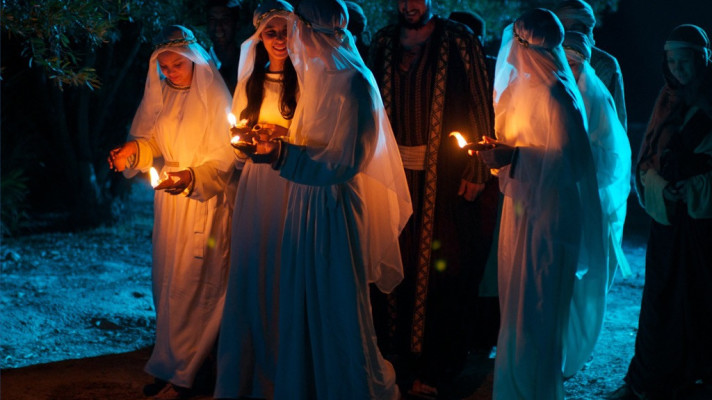
"Those who were foolish took their lamps and took no oil with them, but the wise took oil in their vessels with their lamps" (verses 3-4).
It is vital that we have oil in our vessels. Nothing distinguishes these foolish virgins from the wise, except their lack of oil. Oil is equated to the Holy Spirit and God’s word to a lamp (Zech. 4:1-14; Ps 119:105). But without the oil it is of none effect. The greatest scholar can dissect the Bible expertly, but without the Spirit its truth will remain hidden. No oil, no light!
As the Spirit inspired the Bible, the Spirit is needed to bring its truth into the vessel. We who believe in Christ are His vessels (2 Tim. 2:21). God is not concerned by the shape, age, gender or nationality of the vessel. His concern is getting oil into it in order to generate light!
Jesus tells us He is "the light of the world" (John 8:12). Yet we, the church, are "the light of the world" (Matt. 5:14). Both are true! But the church is only the light if Jesus is manifested in and through it. For that the oil is vital. These foolish virgins discovered that at the darkest hour. But it was too late. The oil cannot fill our vessels in a moment's notice. And it cannot be obtained from others, as the foolish ones discovered. This is because the oil is only obtained through an individual relationship with the oil giver. The extra oil is selfless love that only the Holy Spirit can supply. This is developed over time, through personal prayer, study, and experience. Faith comes from knowing God and knowing God comes from abiding with Christ.
The foolish could not enter the wedding banquet. The bridegroom emphatically declared he knew them not. He wanted to know them, because he wants an intimate relationship with all. But the foolish ones failed to know Him. Although they were believers in appearance and action, they weren't in relationship. The necessary oil was never acquired.
As we surrender our vessels to God daily, He will fill us! We will come to trust him and be intimately acquainted with Him. The flame of God’s word will burn away our selfish humanity and in the process His character will be revealed. Be a wise virgin, go before God in prayer and ask Him for the oil daily. Ask that the Spirit fill you. And even in the dark times, your light will brightly burn.
Used by permission of Lumo Project
Made Straight
Pastor Michael Blog 11 Aug 2017 Michael Falzarano
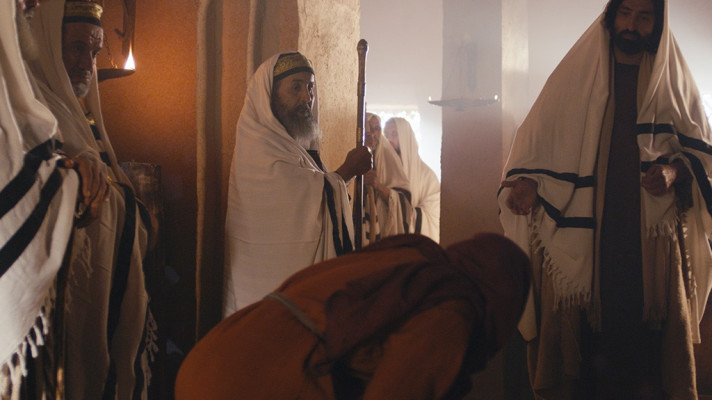
And there was a woman who for eighteen years had had a sickness caused by a spirit; and she was bent double, and could not straighten up at all. (Luke 13:11)
This woman’s life was in ruins. She had a physical condition that caused her to be bent over for 18 long years. This means her view was downwards, away from the Sun’s rays and towards the dinge of the streets. She had no power or means to become straight, or to dispel the darkness of her situation. The same is true spiritually, as it is for all, for all “have sinned” (Romans 3:23). Due to our iniquity we are bent. We were created to be vertical to God and horizontal to others in selfless love and service. But due to sin mankind became bent towards selfishness. We have no power to straighten ourselves, as we are all “dead in… trespasses and sins” (Ephesians 2:1).
This infirmed woman had a low profile in society, an outcast to many. In particular the religious leaders would have been prone to shun her. But the passage poignantly states that Jesus “saw her.” Jesus takes notice of every afflicted soul. He not only sees but he feels and sympathises with us, as he himself bore our “griefs and carried our sorrows” (Isaiah 53:3). His eyes and heart misses none.
Jesus calls this enfeebled woman to himself. This invitation extends to all. And he speaks with heaven’s love and power, “You are freed from your sickness.” This would have been enough, as his word heals and sets right. But Jesus proceeds by touching (laying hands upon) this “unclean” soul. We have a saviour that not only invites us to come to him for healing, but one who made physical contact with us. He took humanity and was tempted as we are. Jesus took the pain and the blight of our disease upon himself. He therefore not only sees our struggles but also has experienced them firsthand.
This woman was now marvellously straight, pointing like a sunflower towards the Sun of righteousness (Malachi 4:2). In so doing she became a torch of God’s power and mercy. She freely glorifies Him. So will you, if you allow him to straighten you through his word and connective touch. You can know your sins are forgiven and be freed of any guilt or bondage that you bear.
Accept his invitation! Make hast and receive His deliverance!
Image used by permission of LumoProject
The Least Of These My Brethren
Pastor Michael Blog 28 Jun 2017 Michael Falzarano

“And the King will answer and say to them, 'Assuredly, I say to you, inasmuch as you did it to one of the least of these My brethren, you did it to Me.'“ (Matthew 25:40, NKJV)
Love for God is best expressed by loving others. The Bible is clear that Christians are to have compassion on those in need. Compassion involves sympathy, but words are often expressed best through practical doings. We are not to aid others in order to make Christians, but by aiding others we are able to express true Christianity, thereby leading them to Christ.
The practical doings mentioned in this parable are visiting the imprisoned, clothing the poor and feeding the hungry. But who are the “least of these My Brethren”? The Bible elsewhere encourages us to reach out and help the improvised, destitute and abandoned. But in the book of Matthew, Jesus’ brethren appear to apply more to his people. The early church suffered as it took the gospel to the world. Jesus suffered with them, as they suffered because of Him. When we express compassion and meet fellow believers' true needs, we have done it unto Jesus. But if we reject the gospel of Christ we reject Christ, if we reject Christ’s brethren we also reject Him.
In the parable of the Sheep of the Goats, Jesus targets a particular people to lavish compassion upon. Matthew associates these brethren with fellow Christians, not only those needy outside her walls. Therefore, judgment concerns not only our response to Christ and His gospel, but also our response to those who preach it and live by it. Many gospel workers continue to be imprisoned, beaten and impoverished for the simple fact they love and follow Jesus. Jesus identifies with them and with their sufferings. He feels their pain, heartache and sorrow. In a more narrow reading than, as Christians we are to love and support our fellow brothers and sisters in their sufferings and need, and in so doing show our love for Christ.
The amazing thing is that these servants of Jesus fail to realise they are indeed responding to Him when they are responding to the needs of their brethren. This is because their works of compassion flow from God. They do, because they are, not so they can get. They have connection with the God of compassion; therefore they are merely active extensions of it. When we respond to the needs of our brothers and sisters in Christ, we are actually responding to Jesus. Therefore, let us ease His tears by easing their tears.
Image by Treehugger / Allison McAdams